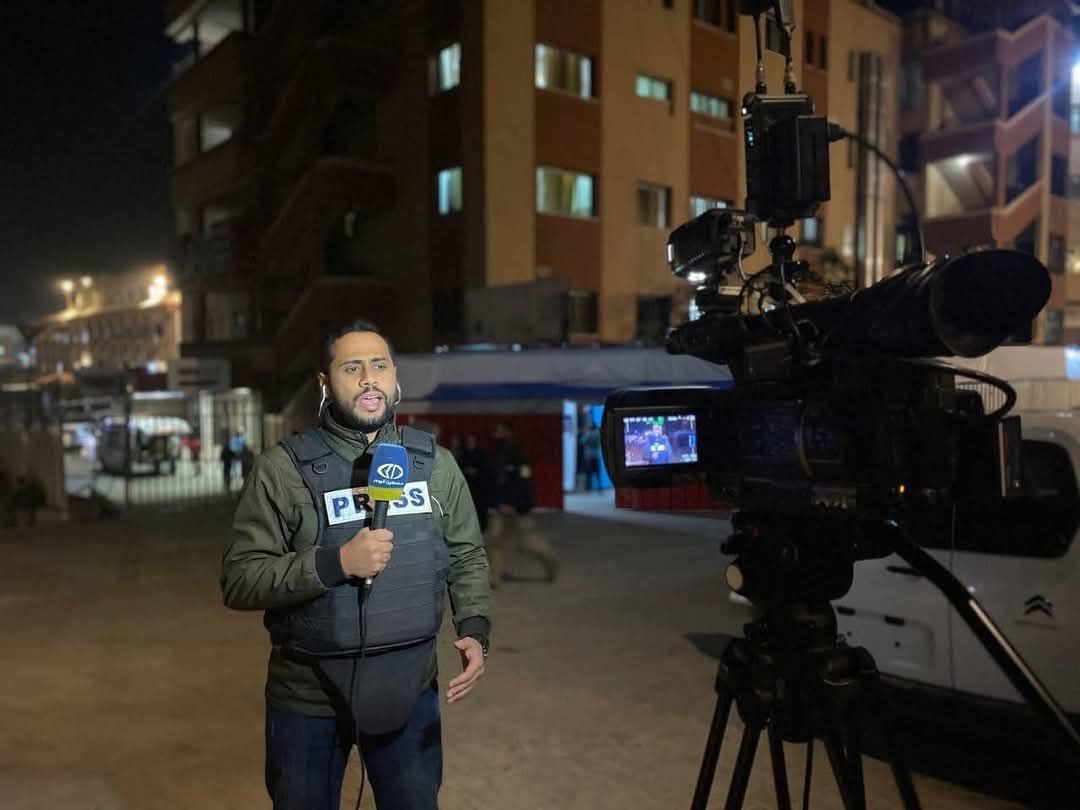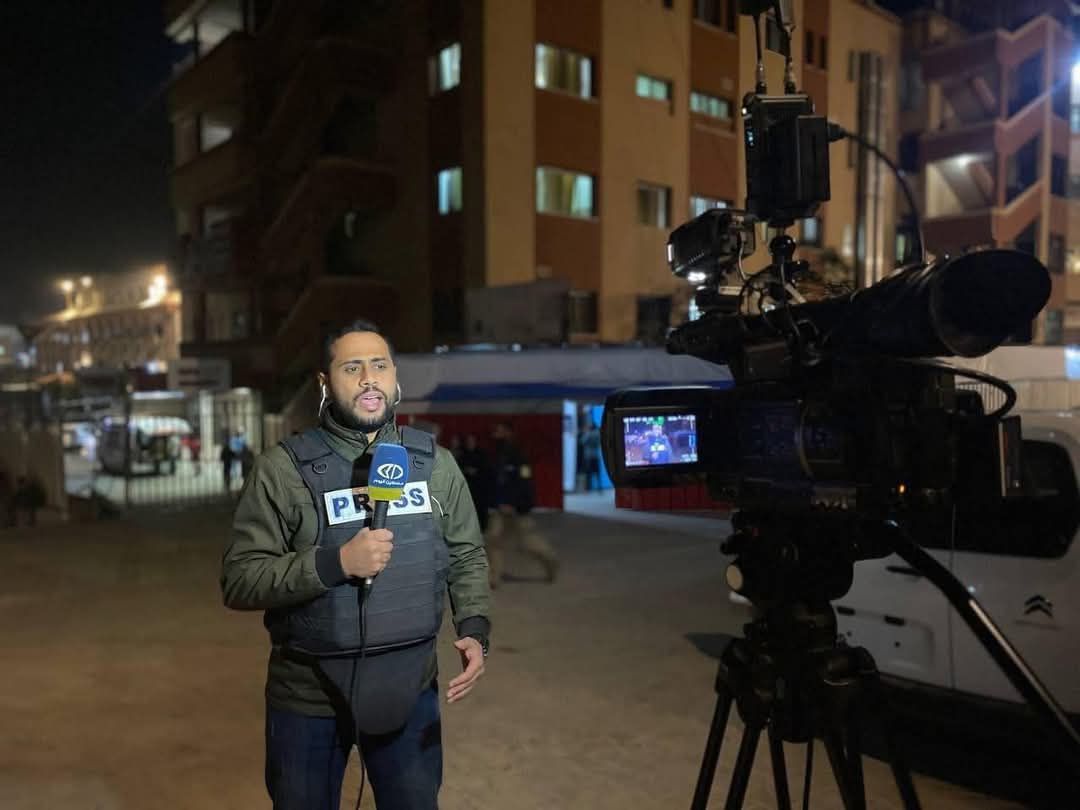BREAKING: Palestinian Journalist Killed in Israeli Airstrike!
Tragic Loss of Journalist Mohammad Mansour in Israeli Airstrike
In a deeply saddening event reported on March 24, 2025, journalist Mohammad Mansour, associated with Palestine Today TV, was killed in an Israeli airstrike that targeted a residential house in Khan Younis, Gaza. This incident has sparked outrage and condemnation from various media organizations and human rights advocates worldwide, highlighting the ongoing challenges faced by journalists reporting from conflict zones.
Context of the Airstrike
The airstrike, which resulted in the tragic death of Mansour, is part of a broader context of escalating tensions in the region. Over the years, the Israeli-Palestinian conflict has seen numerous incidents where journalists have found themselves at risk while covering the story. The targeting of media personnel raises significant questions about press freedom and the safety of journalists in war zones.
The Role of Journalists in Conflict Zones
Journalists play a crucial role in bringing awareness to the conditions faced by civilians in conflict zones. They provide insights into the realities of war, often at great personal risk. The loss of Mohammad Mansour is a stark reminder of the dangers that journalists face in their pursuit of truth and accountability. His work at Palestine Today TV contributed to the dissemination of information regarding the ongoing humanitarian crisis in Gaza, making his death a significant loss not only for his family and colleagues but for the entire media community.
Global Reactions and Condemnations
The news of Mansour’s death has prompted immediate reactions from various organizations and individuals. Media advocacy groups have condemned the airstrike, calling for accountability and urging for the protection of journalists in conflict areas. The International Federation of Journalists (IFJ) and Reporters Without Borders (RSF) have both issued statements expressing their outrage and calling for an investigation into the circumstances surrounding his death.
- YOU MAY ALSO LIKE TO WATCH THIS TRENDING STORY ON YOUTUBE. Waverly Hills Hospital's Horror Story: The Most Haunted Room 502
Press Freedom Under Threat
This tragic event underscores the precarious situation of press freedom in conflict zones. Journalists often face harassment, arrest, and even death while trying to report on the truth. The targeting of media personnel not only undermines the principle of freedom of expression but also deprives the public of crucial information about ongoing conflicts. The killing of Mohammad Mansour is a stark reminder of the need for greater protection for journalists worldwide, especially in war-torn regions.
The Importance of Accountability
In the wake of such incidents, the call for accountability becomes paramount. Human rights organizations advocate for investigations into attacks on journalists and the need for governments to ensure the safety of media workers. The international community must hold those responsible for targeting journalists accountable to prevent further tragedies and uphold the principles of human rights and freedom of the press.
A Call for Solidarity
As the news of Mansour’s death spreads, there is a growing call for solidarity among journalists and media organizations. The need to stand united against threats to press freedom has never been more critical. Initiatives aimed at protecting journalists and advocating for their rights can help create a safer environment for those reporting from conflict zones.
Conclusion
The tragic loss of Mohammad Mansour serves as a poignant reminder of the risks faced by journalists in conflict areas. His dedication to reporting the truth and shedding light on the humanitarian issues in Gaza will not be forgotten. As the world reacts to this devastating news, it is crucial for advocates of press freedom to come together to demand accountability and protection for journalists everywhere. The fight for a free press is vital in ensuring that the voices of those affected by conflict are heard and that the truth prevails.
In summary, the assassination of Mohammad Mansour highlights the ongoing dangers faced by journalists in war zones and the urgent need for increased protection and accountability. As the international community mourns his loss, it is imperative to continue advocating for the rights of journalists and the importance of press freedom in promoting transparency and justice in conflict situations.

BREAKING: Fellow journalist Mohammad Mansour of the Palestine Today TV has been killed in an Israeli airstrike targeting a house in Khan Younis. pic.twitter.com/UgoIYBgZ0d
— Quds News Network (@QudsNen) March 24, 2025
BREAKING: Fellow journalist Mohammad Mansour of the Palestine Today TV has been killed in an Israeli airstrike targeting a house in Khan Younis
The world is reeling from the tragic news that fellow journalist Mohammad Mansour of Palestine Today TV has been killed in an Israeli airstrike targeting a house in Khan Younis. This incident has not only shocked the journalistic community but has also raised serious questions about the ongoing conflict and the safety of reporters working in war zones.
In a world where media coverage plays a crucial role in shaping public perception of events, the loss of a journalist like Mansour is a significant blow. It underscores the dangers that reporters face, particularly in regions marked by conflict and violence. The airstrike that claimed his life is part of a broader narrative surrounding the Israel-Palestine conflict, which has seen a surge in violence and casualties in recent years.
The Context of the Airstrike
To fully understand the gravity of this situation, it’s important to look at the context. The ongoing conflict between Israel and Palestine has a long and complicated history, marked by periods of relative calm punctuated by escalations in violence. Khan Younis, located in the southern Gaza Strip, has often been a focal point for such violence. The airstrike that killed Mansour is just one of many incidents that illustrate the fragility of the situation in this region.
Reports indicate that the airstrike targeted a residential house, raising alarms about the increasing civilian casualties in such operations. According to eyewitness accounts, the building was not only home to families but also served as a workspace for journalists and activists. This raises ethical questions about military operations in densely populated areas and the responsibility to minimize civilian harm.
The Impact on Journalism
The death of Mohammad Mansour is a stark reminder of the risks that journalists take to report the truth. In conflict zones, journalists often operate under extreme conditions, facing threats from various factions, including military operations, censorship, and even violence against them personally. The fact that a journalist was killed while fulfilling his duty to inform the public is a profound loss for the media community.
Mansour was known for his dedication to covering the Palestinian narrative, shedding light on the struggles and challenges faced by the people in Gaza. His work not only provided insight into the realities on the ground but also served as a crucial counter-narrative to mainstream media portrayals. The consequences of his death extend beyond the immediate loss; they impact the freedom of the press and the ability of journalists to operate safely.
The Reactions and Condemnations
In the wake of this tragedy, the reaction from the international community has been swift. Numerous organizations have condemned the airstrike and called for accountability. The Committee to Protect Journalists (CPJ) and Reporters Without Borders (RSF) have both issued statements emphasizing the need for the protection of journalists working in conflict zones. Their calls for justice resonate with the broader demand for safety measures to be put in place to protect media personnel.
Social media platforms have also become a space for mourning and remembrance. Many journalists and activists are sharing tributes to Mansour, highlighting his contributions to journalism and the void his passing leaves. The hashtag #JusticeForMansour has started trending, bringing attention to the dangers faced by journalists worldwide.
Lessons Learned and Future Implications
The loss of Mohammad Mansour should serve as a wake-up call for the global community. It’s vital to recognize that journalists are not just observers in conflict zones; they are often targets. Governments and military organizations need to prioritize the safety of media personnel and ensure that operations are conducted with a clear understanding of the potential consequences for civilians and journalists alike.
Furthermore, this incident highlights the importance of supporting independent journalism. In a time when media outlets are often under threat from various sides, it’s crucial to promote and protect those who are dedicated to reporting the truth. Organizations that advocate for press freedom must continue to push for legal protections and safety measures for journalists working in high-risk areas.
The Bigger Picture: Ongoing Conflict and Civilian Impact
Mansour’s death is a tragic chapter in the ongoing saga of the Israel-Palestine conflict. The cycle of violence has created a humanitarian crisis that affects millions of people. Innocent civilians often bear the brunt of military operations, and the death toll continues to rise. According to various reports, the situation in Gaza has deteriorated, with limited access to basic necessities such as food, water, and medical care.
Humanitarian organizations are calling for increased support to help those affected by the violence. The international community has a responsibility to advocate for peace and protect the rights of civilians caught in the crossfire. The loss of life, whether it be journalists like Mansour or innocent civilians, should serve as a powerful reminder of the urgent need for a resolution to the conflict.
Moving Forward: Advocacy and Awareness
As we reflect on the tragic death of Mohammad Mansour, it’s essential to keep the conversation going. Awareness is key to ensuring that such tragedies do not continue unchecked. Advocating for the protection of journalists and civilians in conflict zones is a collective responsibility that requires action from individuals, organizations, and governments.
Engaging in discussions about media freedom, the ethics of military operations, and the safety of journalists is crucial. By raising awareness and supporting initiatives aimed at protecting reporters, we can honor the memory of those who have lost their lives while seeking the truth.
In honor of Mohammad Mansour and the countless journalists who have sacrificed their lives for the cause of truth, we must strive to create a safer environment for all media personnel. Their work is vital in shaping our understanding of global events, and their safety should always be a priority.
The Role of Social Media in Reporting
In today’s digital age, social media plays a pivotal role in how news is disseminated and consumed. Platforms like Twitter allow journalists to share real-time updates, engage with their audience, and amplify important stories. However, this immediacy also comes with challenges, including the spread of misinformation and the potential for online harassment.
The tragic news of Mansour’s death spread rapidly on social media, sparking discussions about the responsibilities that come with such platforms. It’s essential for users to critically evaluate the information they consume and share, ensuring that they support credible journalism. By doing so, we can help protect the integrity of the news and the journalists who bring it to us.
Conclusion: Honoring a Legacy
The loss of Mohammad Mansour is not just a personal tragedy; it’s a loss for all of us who rely on journalism to keep us informed. As we mourn his passing, let’s also commit to advocating for the safety of journalists everywhere. His dedication to reporting the truth will continue to inspire future generations of journalists who will brave danger to tell the stories that matter.
In honoring his legacy, we must work collectively to ensure that such tragedies become a thing of the past. Through awareness, advocacy, and support for independent journalism, we can strive to create a safer environment for those who dedicate their lives to the pursuit of truth.

